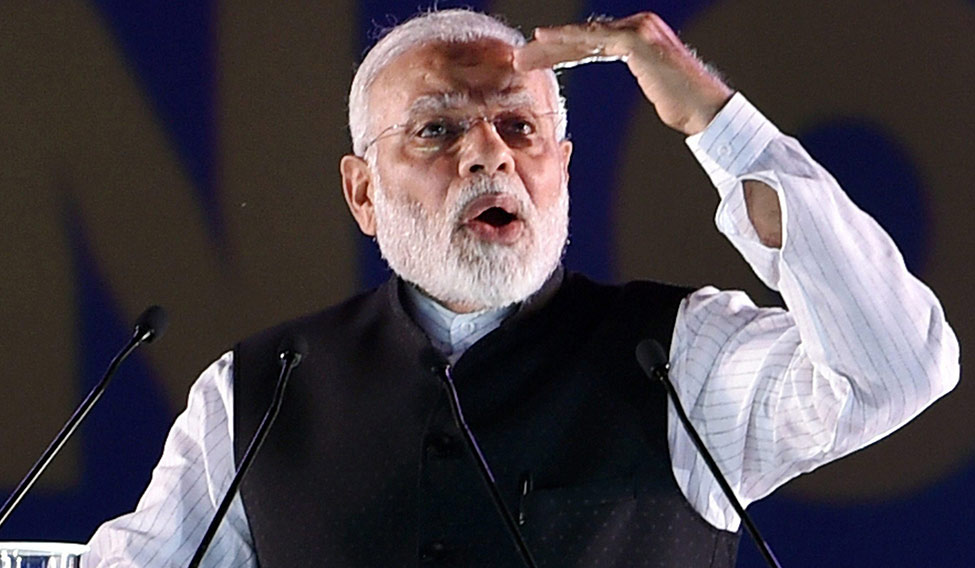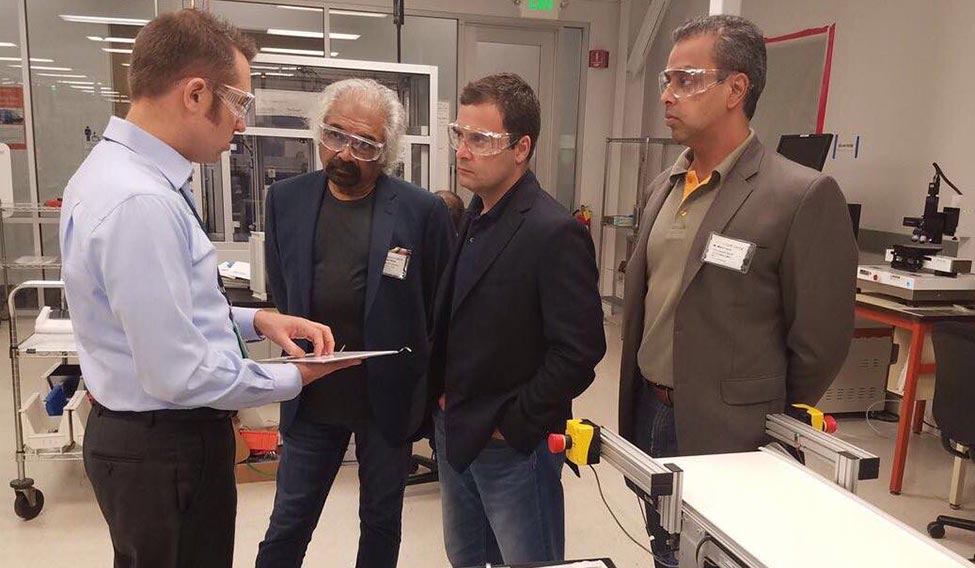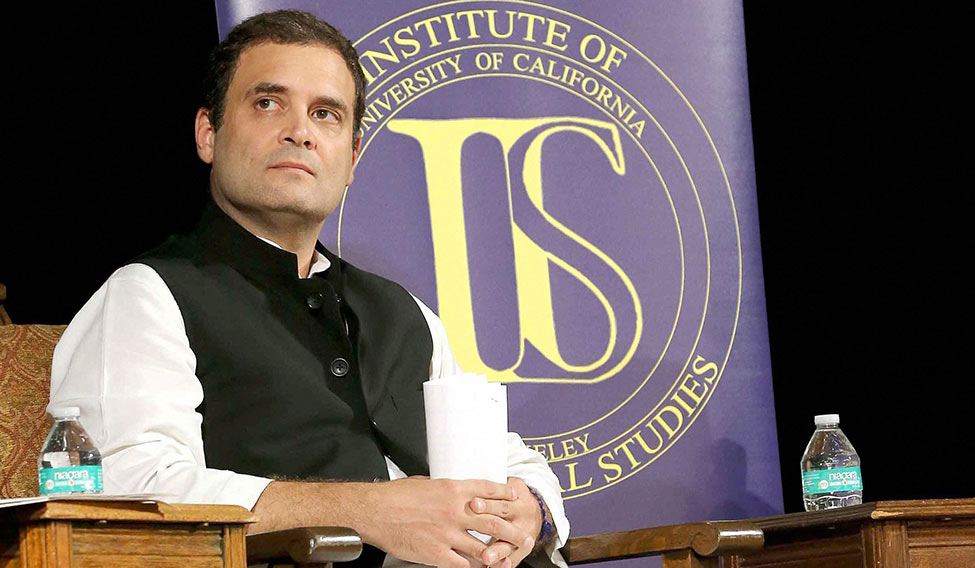The University of California, Berkeley, is renowned as a centre that nurtures liberal thought and encourages questioning of the establishment. When Congress vice president Rahul Gandhi took to the podium at Berkeley’s International House, it was expected that he would be questioned on what was wrong with the Indian democracy, which included dynastic politics and corruption in Indian polity.
These questions were, of course, asked of the 47-year-old Congress scion, who is himself the foremost dynast in Indian polity and whose party lost the 2014 Lok Sabha elections primarily because of the stigma of corruption. Dressed in a white kurta-pyjama paired with a black Nehru jacket, Rahul was ready to answer all these questions. More importantly, he came prepared to question the policies and politics of the Narendra Modi government at the cost of being criticised for doing so on foreign soil.
It was still very early in New Delhi when Rahul’s quotes from Berkeley began trickling in. And, soon, the Congress and the BJP were all ears. This trip to the US had generated much mirth beforehand—BJP leaders cracked jokes about him going there to learn about artificial intelligence, and Congress leaders wanted him here as assembly elections were around the corner. Ironically, the same visit kicked up a political storm back home.
He took everyone by surprise as he attacked the Modi government and said he was ready to become Congress president and the prime minister candidate for the Lok Sabha elections in 2019. He was also upfront on dynastic politics and tried to lay the ghost of the anti-Sikh riots to rest by condemning it unequivocally.
Rahul’s great-grandfather Jawaharlal Nehru had also delivered a speech at Berkeley, and with the legacy of the country’s first prime minister seemingly under threat amidst what is being described as growing intolerance, it was pertinent he spoke on the theme.
“What can destroy our momentum is the opposite energy: hatred, anger and violence and the politics of polarisation which has raised its ugly head in India today,” Rahul said.
 Defensive move: To defend the prime minister, the BJP deployed its best | PTI
Defensive move: To defend the prime minister, the BJP deployed its best | PTI
The other main plank of Rahul’s attack was the decline in economy. At a time when the government is finding it difficult to answer questions about the benefits of demonetisation, Rahul attacked the PM for taking “ad hoc decisions” in a “reckless and dangerous manner.” “Demonetisation, a completely self-inflicted wound, caused approximately 2 per cent loss in India’s GDP,” he said.
He said 30,000 new youngsters were joining the job market every day, and, yet, the government was creating only 500 jobs a day. He said the economic decline was “worrying” and had led to “an upsurge of anger”. He ripped into the “hastily-applied GST”, too.
Rahul also attacked the Modi government on its handling of Jammu and Kashmir, saying that the BJP had in just 30 days, by forming a government with the PDP, undone the work done by the United Progressive Alliance in nine years to bring peace to the valley. He also took on Modi’s foreign policy, saying that while relations with the US were on the upswing, India was losing old allies like Russia and was becoming increasingly isolated in the neighbourhood.
Rahul even accused Modi of running a propaganda machinery to sully his image. “There’s a BJP machine, a thousand guys with computers, to abuse me, tell you I am reluctant, I am stupid... It is a tremendous machine. All day they spread abuse about me, and the operation is run by the gentleman who is running our country,” he said.
As he took on Modi, it was clear that he had no hesitation in placing himself as the main opponent of the prime minister. His comfort level with the positioning was apparent as he admitted to Modi’s skills. “I am an opposition leader. But Mr Modi is also my prime minister. Mr Modi has certain skills. He is a very good communicator, probably better than me,” he said.
The onslaught rattled the BJP, which launched its top guns to mount a counter attack. Union Information and Broadcasting Minister Smriti Irani called Rahul “a failed dynast”. “To say that dynasty is the culture of India is an anomaly,” she said. “People occupying the top constitutional posts, be it President Ram Nath Kovind, Vice President Venkaiah Naidu or the Prime Minister, they all come from humble backgrounds.”
 Looking ahead: Rahul, flanked by Sam Pitroda and Milind Deora (extreme right), at SunPower Corporation, Silicon Valley | @Rahulgandhi
Looking ahead: Rahul, flanked by Sam Pitroda and Milind Deora (extreme right), at SunPower Corporation, Silicon Valley | @Rahulgandhi
BJP president Amit Shah said failed leaders were running off to the US to lecture as no one listened to them back home. Said BJP spokesperson G.V.L. Narasimha Rao, “Rahul Gandhi’s statement is in complete variance with the reality of new India where merit leads over inheritance.”
Rejecting the BJP’s criticism, Congress’s Jaiveer Shergill said: “Questioning the government cannot be equated with insulting the country. Also, in today’s age of technology, the physical location of where the point is made is irrelevant.”
The joke in BJP circles is that Rahul is the saffron party’s biggest asset. However, the party has often reacted to him in a seemingly disproportionate manner. Every time he has attacked Modi or the BJP, be it in Parliament or in election rallies, the BJP has gone after him. And, Irani, who lost to Rahul in Amethi in 2014, has been fielded as his prime attacker.
The one time that the BJP had really got rattled was when Rahul called the BJP government “Suit Boot Ki Sarkar”. The title is seen as having damaged Modi’s image and contributed to the party’s failure in the assembly elections in Delhi in 2015. Ever since, Modi has been trying to project his government as being on the side of the underprivileged.
The BJP came into pole position after winning the Uttar Pradesh elections and forming the government in Bihar. Despite these highs, the BJP has been troubled of late by issues such as price rise, perceived failure of demonetisation, the economic downturn, apart from low employment opportunities. Significantly, in the aftermath of journalist Gauri Lankesh’s murder, the social media wave has turned against the BJP.
And, though the two may not be connected, coming as it did a day after Rahul’s speech, the saffron-affiliated ABVP lost to the Congress’s student wing, NSUI, in the Delhi University Students’ Union elections, where it had been in power for four years.
Congressmen are happy that Rahul ended all speculation about stepping into Sonia’s shoes. “By expressing his willingness to lead the Congress party, Rahul has energised the party. Now there is no room for ambiguity about leadership,” said Rajasthan Congress president Sachin Pilot. He said Rahul’s willingness to be prime ministerial candidate would have a positive impact on the assembly polls in Gujarat and Himachal Pradesh later this year, and Karnataka next year.
Rahul spoke with unusual candour on dynastic politics. “Actually, most parties in India have that problem. So, don’t give us stick. Mr Akhilesh Yadav is a dynast. Mr Stalin is a dynast. Mr Dhumal’s son is a dynast. Even Abhishek Bachchan is a dynast. That is how India runs. Don’t get after me because that is how the entire country is running. By the way, last I recall, Mr Ambani’s kids were running the business. And, that was also going on in Infosys.”
However, political scientist Abhay Kumar Dubey of the Centre for the Study of Developing Societies said the statement was in “bad taste”. “Dynasty militates against the very idea of democracy. He should rather have been critical of it,” he said.
The organisational elections are getting over in October, and it is likely to culminate in an All India Congress Committee session where Rahul is set to take over as Congress president from his mother, Sonia Gandhi.
A crucial factor in the transition has been the concern among senior leaders about where will they be once Rahul takes over. They have unofficially often expressed doubts about Rahul’s scheme of things and stated that they are more comfortable working with Sonia.
Rahul is certainly not oblivious to this feeling, and he addressed it at Berkeley. “I still believe as many [young people] as possible should be pushed forward,” he said. “But, there is tremendous talent in the Congress party, with some of our senior people. And it is really unfair to say that just because you are slightly old, we are not going to utilise you. So, it is a mix. It is trying to make both these systems work together, both the young and the old work together.”
This mix is already evident. If younger faces have been brought into the AICC—such as R.P.N. Singh to oversee Jharkhand, K.C. Venugopal for Karnataka and Chella Kumar, instead of Digvijaya Singh, for Goa—senior leaders like Ashok Gehlot (Gujarat) and Sushil Kumar Shinde (Himachal Pradesh) have been given the charge of election-bound states.
“The energy of the young and the experience of the old have to go hand-in-hand. It is already happening. A young person like me has been put in charge of Mahila Congress, and I have got the opportunity to work with senior leaders of the Congress,” said Sushmita Deb.
Rahul admitted the party had lost touch with the ground reality as it became arrogant, leading to its loss in the Lok Sabha elections. Congress MP Gaurav Gogoi said, “There is a strong, positive reception to what he said about the Congress. He showed remarkable candour in giving an insight into what is wrong with the Congress and what has to be done.”
With the speech coming just about a month before Rahul is expected to take charge of the Congress, it is felt that he has in his speech laid out the template to be followed by the party as it takes on the BJP in the assembly elections as well as the Lok Sabha polls.
BJP’S DISMAL MONSOON
* Murder of journalist Gauri Lankesh
* Questions over success of demonetisation, after the RBI report
* Failure to get its OBC constitutional bill passed in its original form
* GDP growth at three-year low of 5.7%
* Worrying employment trends
* Problems in GST implementation
* Supreme Court overruled government’s objections to privacy as constitutional right
* Failure to defeat Sonia Gandhi’s political secretary Ahmed Patel in Rajya Sabha polls
* Kashmir crisis






